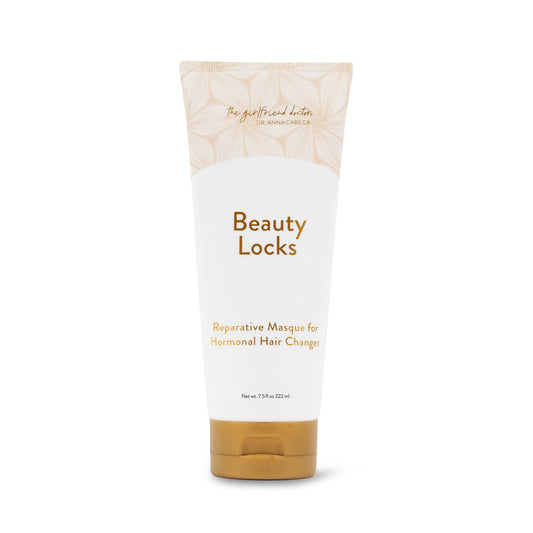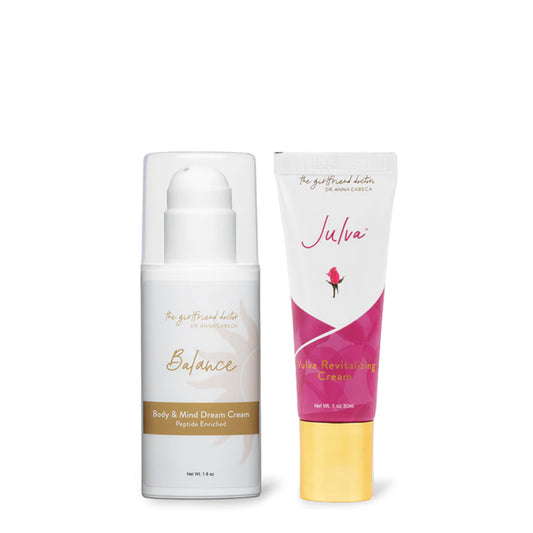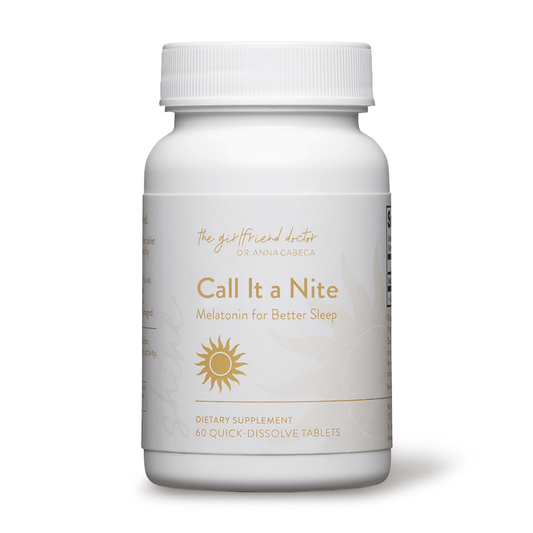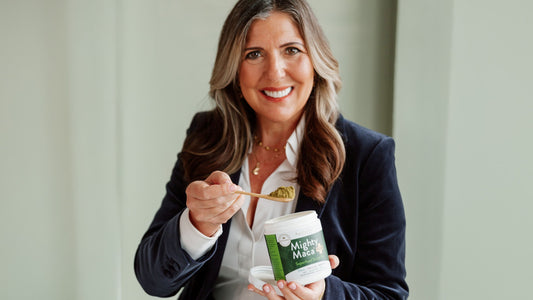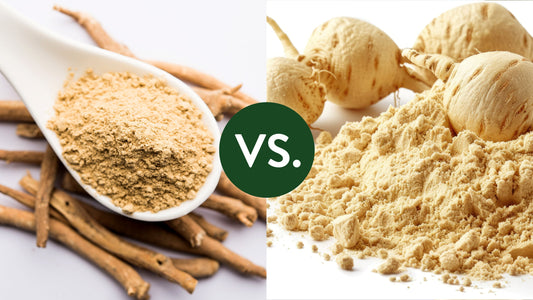When you’re young, you don’t really think about aging, do you? You aren’t worried about muscle atrophy, heart disease, or osteoporosis. And then, one day, it happens.
Maybe you find a single grey hair in your eyebrow (this happened to me recently!) Or maybe you feel a little tired after a day of shopping (when you used to hit the mall for six-hour shopping sprees no problem).
Maybe you have the same heart-stopping moment I had years ago, when I was in the shower, with clumps of my hair in my hands.
The panic sets in as you realize hair loss during menopause is common. And suddenly, you feel 102 years old.
When I went through early menopause in my late 30s, it thrust me into a situation where I had to think about aging. I didn’t have a choice. The woman in the mirror looked like a stranger. My hairline was receding. My once-thick ponytails became pathetic wisps that I tried desperately to disguise with strategic styling and an increasing collection of headbands and scarves.
But I was able to turn it all around, and you can too. Here’s how I changed my outlook on aging — and saved my hair in the process.

Let me take you back to one of the darkest chapters of my life. I was intensely grieving the loss of my son, a trauma that shattered my world. Then came the medical blow: premature ovarian failure at 38. Early menopause. The end of my fertility, the end of my hope for more children, the end of feeling like a "complete" woman.
I was drowning in grief, and my body decided to pile on one more cruel twist.
My hair — my gorgeous, thick, lustrous hair started abandoning me. Not gradually. This was dramatic, devastating, and impossible to ignore. I would wake up with hair on my pillow. I'd run my hands through my hair and come away with dozens of strands wrapped around my fingers. The shower drain became a daily source of horror.
As a physician, I understood the biology. I knew that hormones affected hair growth and that hair loss in menopause happens. But understanding the science didn't make it any less emotionally devastating to watch my femininity, as I understood it then, literally wash down the drain.
I felt like I was disappearing, piece by piece.
Every morning, I'd stand in front of the mirror and try to arrange what was left of my hair to cover the increasingly visible scalp. Every morning, I'd fail a little more.
I was treating my hair loss like a cosmetic emergency that needed to be hidden, covered up, and fixed from the outside. I was so focused on the symptom that I was missing the message entirely.
When Symptoms Become Signals
The turning point came when I stopped asking "How do I hide this?" and started asking "What is my body trying to tell me?"
As both a physician and a woman in crisis, I knew I had to approach this differently. Instead of seeing my menopausal hair loss as a vanity problem or an inevitable part of aging, I began to understand it as what it really was: a symptom of profound hormonal chaos.
My hair wasn't just falling out randomly. It was responding to a perfect storm of hormonal disruption:

TESTOSTERONE DOMINANCE: With my estrogen and progesterone crashing due to premature menopause, testosterone became proportionally higher, leading to DHT production that literally attacked my hair follicles

CORTISOL OVERLOAD: The chronic stress from grief and trauma was flooding my system with cortisol, disrupting the delicate balance needed for healthy hair growth.

NUTRIENT DEPLETION: The stress was depleting crucial hair-supporting nutrients like zinc, iron, and B vitamins faster than I could replenish them.
This was about a body in survival mode, shutting down "non-essential" functions like growing lustrous hair so it could focus on keeping me alive during an incredibly traumatic time.
Once I understood this, everything changed. I stopped seeing my hair loss as a personal failing or a sign that I was becoming less attractive. Instead, I saw it as my body's way of saying: "Help me. I'm overwhelmed. I need support to heal."
That shift in perspective, from shame to understanding, from hiding to healing — was the beginning of my transformation.
From Menopause Hair Loss to Hair Wisdom
Today, decades later, I have healthy, strong hair again. But more importantly, I have something I didn't have before: the wisdom to understand that our bodies are always communicating with us, and symptoms like hair loss in menopause are invitations to deeper healing.
Here's what I learned about reversing hair loss naturally. Not just covering it up, but actually addressing the root causes:
Hormonal Harmony: I developed my Keto-Green® approach specifically to address the hormonal chaos that drives hair loss. By balancing insulin, cortisol, and supporting healthy estrogen metabolism, I gave my body the foundation it needed for healthy hair growth.
Targeted Nutrition: I learned that hair loss often signals specific nutrient deficiencies. Zinc supplementation may support healthy hormone balance by influencing DHT production — a factor in hair follicle health. Getting my iron and ferritin levels optimal (around 50 ng/ml) gave my hair follicles the fuel they needed. Adding selenium from foods like Brazil nuts supported my thyroid function.
Stress Management: I had to face the reality that chronic stress was literally making my hair fall out. Learning to manage cortisol through meditation, proper sleep, and stress-reduction techniques wasn't just good for my mental health — it was essential for my hair health!
Topical Support: Eventually, this journey led me to create Beauty Locks, a nutrient-dense hair masque that provides direct nourishment to hair and scalp. But I only developed this after I understood that topical treatments work best when combined with internal healing.
The Deeper Truth: Most importantly, I learned that trying to restore my hair was really about trying to restore my sense of self. And while healthy hair is wonderful, true healing came from accepting and loving myself through every stage of the journey.

If you're reading this with thinning hair, or you've noticed more strands in your brush lately, or you're avoiding certain hairstyles because they reveal too much scalp — I want you to know something: You're not vain for caring about this. You're not shallow for feeling upset about hair loss during menopause. And you're definitely not powerless to change it.
Your hair loss isn't a sign of inevitable aging. It's information. It's your body's way of saying that something deeper needs attention.
Maybe your hormones need support. Maybe your stress levels need managing. Maybe your nutrition needs upgrading. Maybe your thyroid needs love. Or maybe, like me, you need to heal from trauma that's showing up in unexpected ways.
The beautiful thing about understanding hair loss as a hormone signal is that when you address the underlying imbalances, you don't just potentially regrow your hair — you often feel better in every way. More energy, better mood, improved sleep, clearer thinking.
Where to Start Your Hair Healing Journey
If you're ready to stop hiding and start healing, here's where I suggest you begin:
Get comprehensive hormone testing. Don't settle for "normal" ranges. Look for optimal levels of thyroid hormones, sex hormones, and cortisol patterns.
Address the basics. Clean up your nutrition with hormone-supporting foods, manage your stress with daily practices, and ensure you're getting quality sleep.
Consider targeted supplementation. Work with a practitioner who understands the connection between hormones and hair health.
Be patient with the process. Hair grows slowly, and healing takes time. But every day you're supporting your body's healing is a day you're moving toward healthier hair and a healthier you.
Remember: Your hair loss isn't happening TO you — it's happening FOR you. It's your body's way of getting your attention, of asking for the care and support it needs to heal.
Listen to what it's trying to say. Your future self (and your future hair) will thank you.


